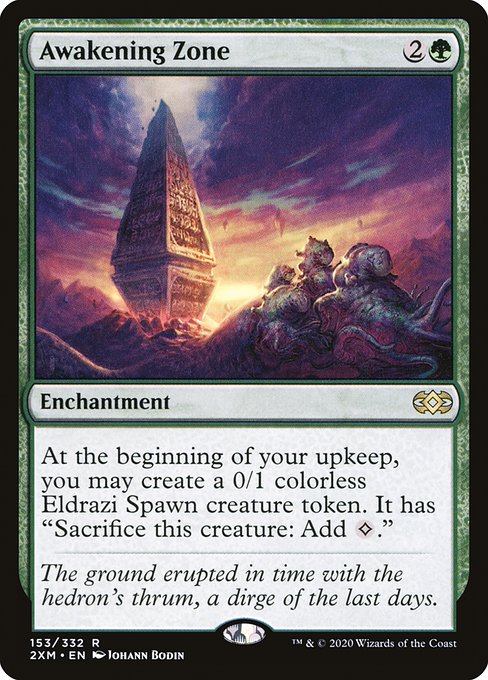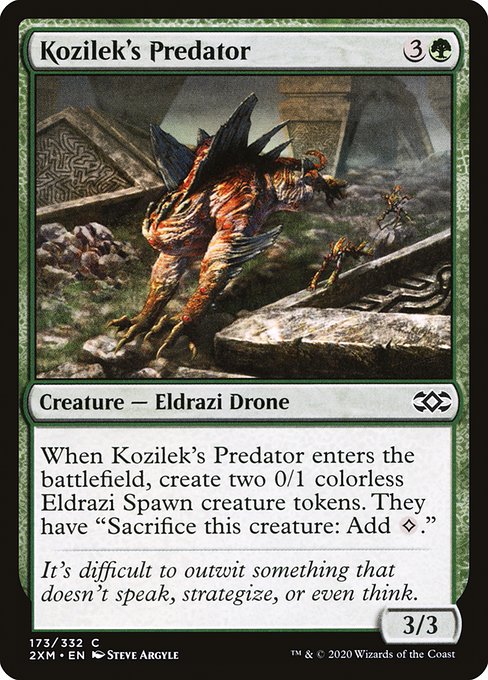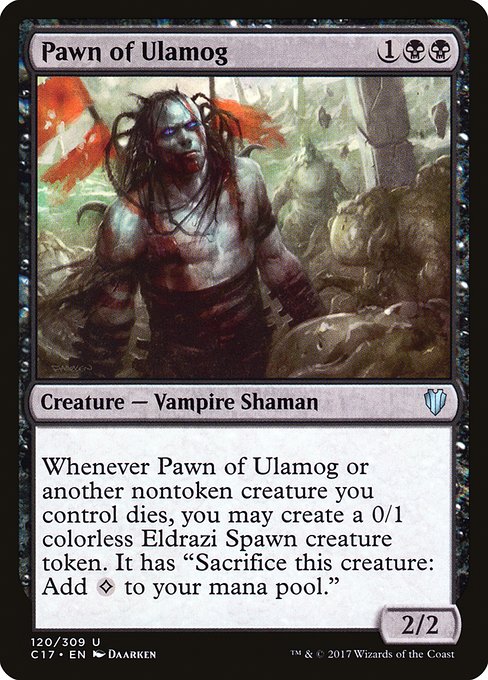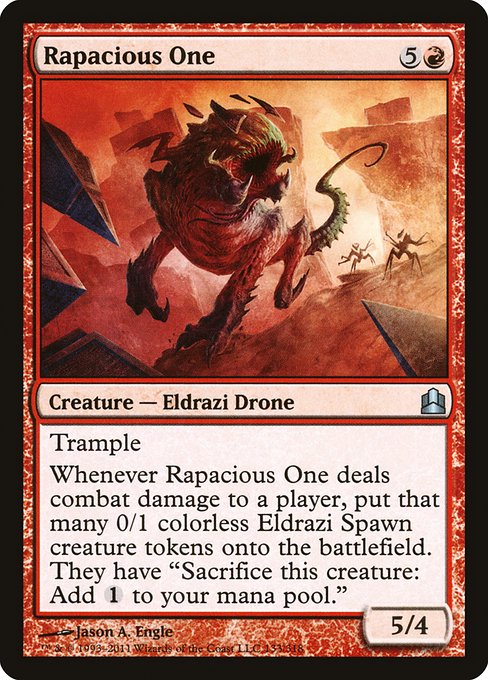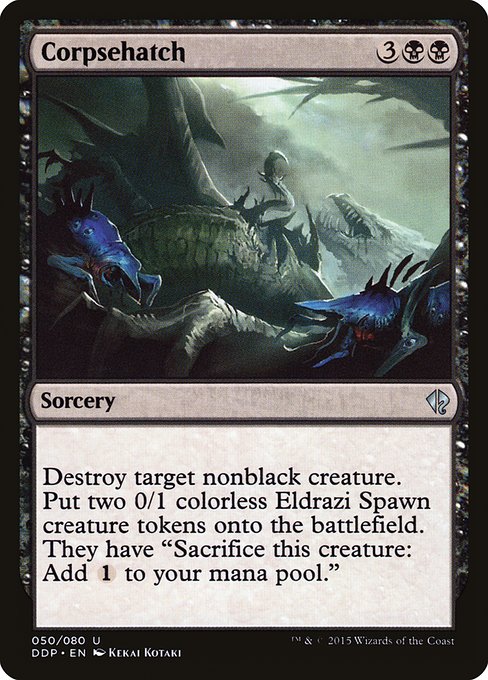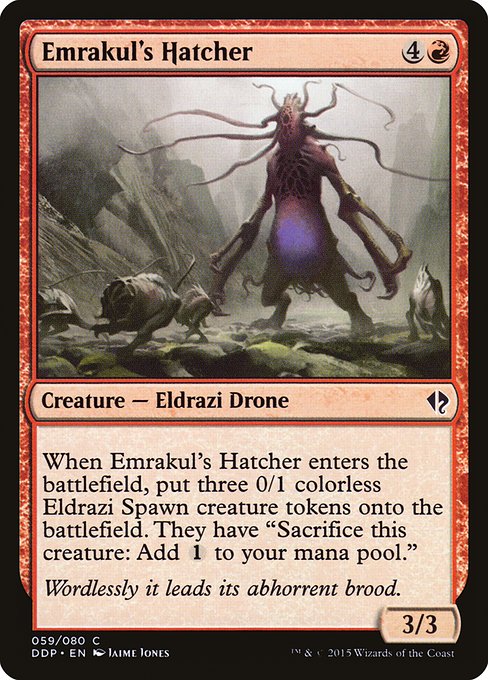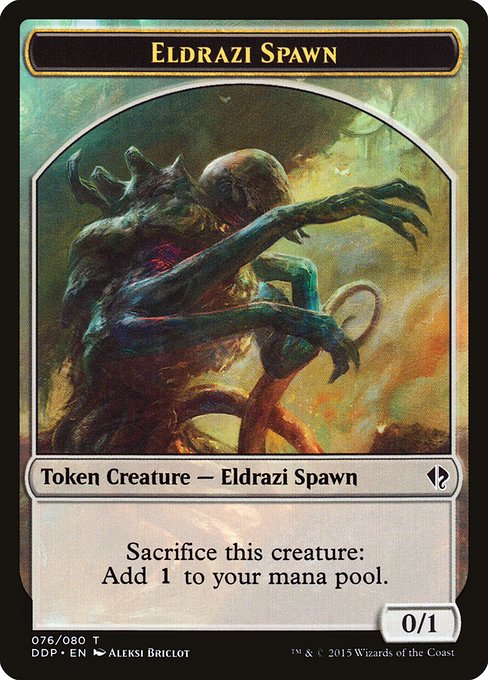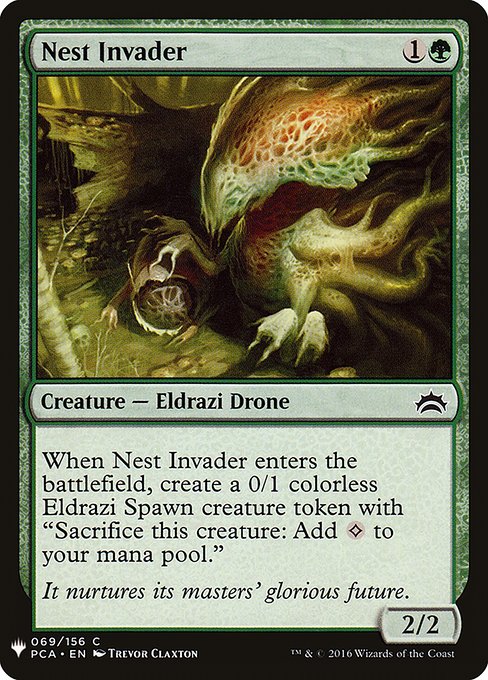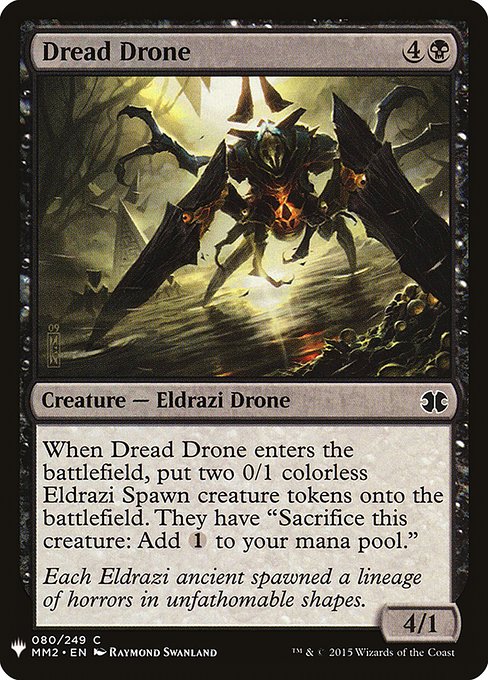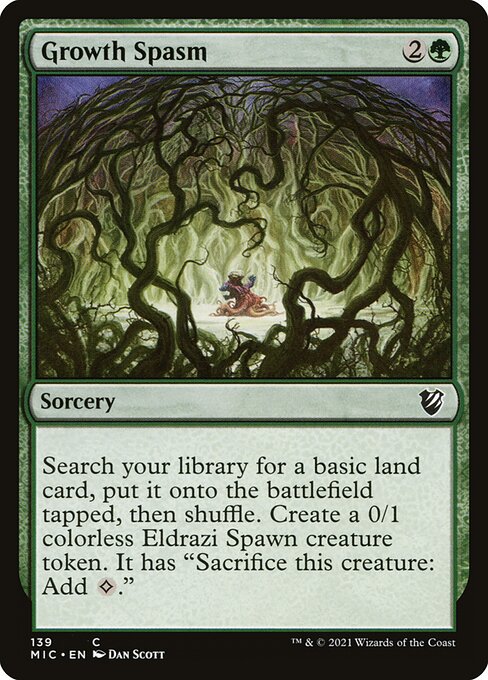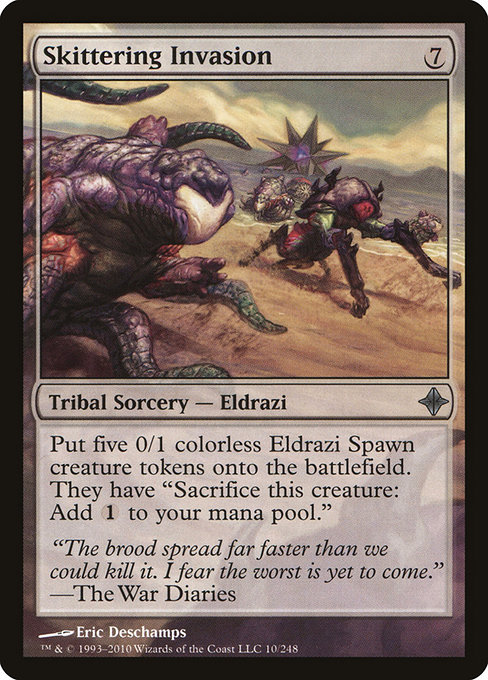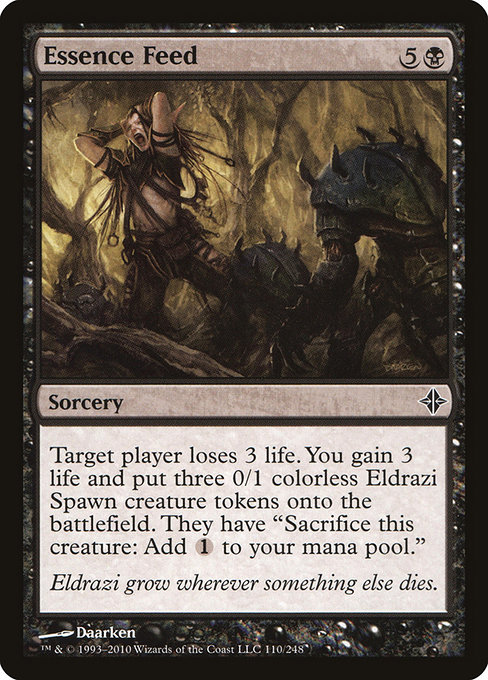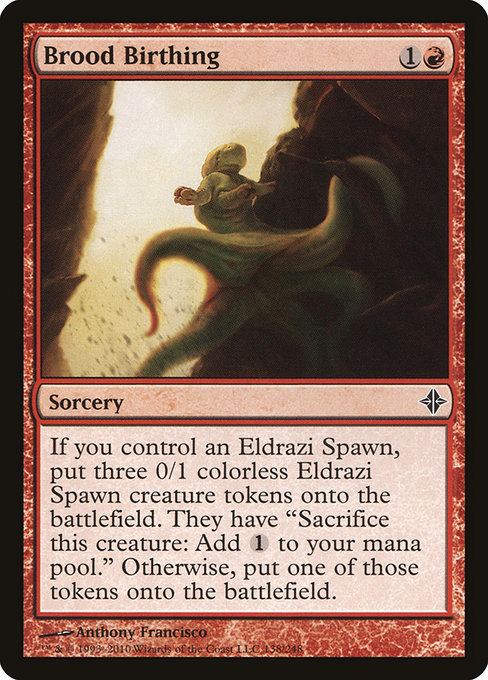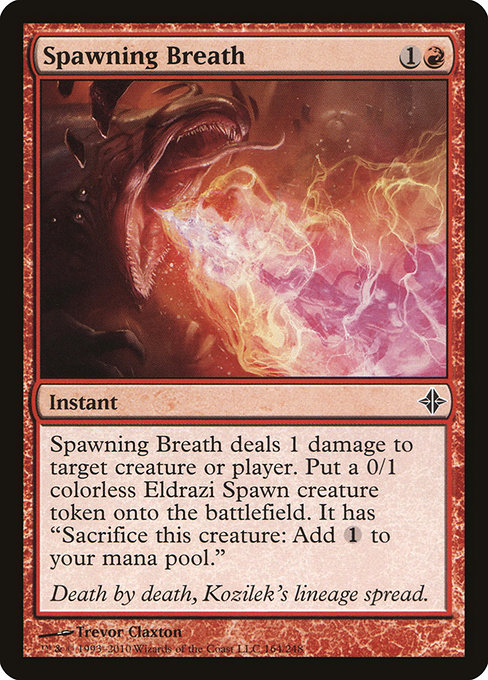Spawnsire of Ulamog
Creature — Eldrazi
Annihilator 1 (Whenever this creature attacks, defending player sacrifices a permanent.)
: Create two 0/1 colorless Eldrazi Spawn creature tokens. They have "Sacrifice this creature: Add ."
: Cast any number of Eldrazi spells from among cards you own outside the game without paying their mana costs.
: Create two 0/1 colorless Eldrazi Spawn creature tokens. They have "Sacrifice this creature: Add ."
: Cast any number of Eldrazi spells from among cards you own outside the game without paying their mana costs.
7/11
standard
future
historic
gladiator
pioneer
explorer
modern
legacy
pauper
vintage
penny
commander
brawl
alchemy
paupercommander
duel
oldschool
premodern
Rulings
If you cast a card “without paying its mana cost,” you can’t pay any alternative costs. On the other hand, if the card has additional costs, you may pay those.
Annihilator abilities trigger and resolve during the declare attackers step. The defending player chooses and sacrifices the required number of permanents before they declare blockers. Any creatures sacrificed this way won’t be able to block.
In a casual game, the cards you cast from outside the game come from your personal collection. In a sanctioned event, those cards must come from your sideboard. Note that you can’t cast cards from exile this way; exile is a zone in the game.
If a creature with annihilator is attacking a planeswalker, and the defending player chooses to sacrifice that planeswalker, the attacking creature continues to attack. It may be blocked. If it isn’t blocked, it simply won’t deal combat damage to anything.
You cast Eldrazi cards from outside the game as part of the resolution of Spawnsire of Ulamog’s last ability. You may cast those cards in any order. Timing restrictions based on the card’s type (such as creature or sorcery) are ignored. Other restrictions are not (such as the one from Rule of Law). You cast all of the cards you like, putting them onto the stack, then the ability finishes resolving. The spells you cast this way will then resolve as normal, one at a time, in the opposite order that they were put on the stack. They’ll remain in the game for the remainder of that game.
Annihilator abilities trigger and resolve during the declare attackers step. The defending player chooses and sacrifices the required number of permanents before they declare blockers. Any creatures sacrificed this way won’t be able to block.
In a casual game, the cards you cast from outside the game come from your personal collection. In a sanctioned event, those cards must come from your sideboard. Note that you can’t cast cards from exile this way; exile is a zone in the game.
If a creature with annihilator is attacking a planeswalker, and the defending player chooses to sacrifice that planeswalker, the attacking creature continues to attack. It may be blocked. If it isn’t blocked, it simply won’t deal combat damage to anything.
You cast Eldrazi cards from outside the game as part of the resolution of Spawnsire of Ulamog’s last ability. You may cast those cards in any order. Timing restrictions based on the card’s type (such as creature or sorcery) are ignored. Other restrictions are not (such as the one from Rule of Law). You cast all of the cards you like, putting them onto the stack, then the ability finishes resolving. The spells you cast this way will then resolve as normal, one at a time, in the opposite order that they were put on the stack. They’ll remain in the game for the remainder of that game.
Rulings
If you cast a card “without paying its mana cost,” you can’t pay any alternative costs. On the other hand, if the card has additional costs, you may pay those.
Annihilator abilities trigger and resolve during the declare attackers step. The defending player chooses and sacrifices the required number of permanents before they declare blockers. Any creatures sacrificed this way won’t be able to block.
In a casual game, the cards you cast from outside the game come from your personal collection. In a sanctioned event, those cards must come from your sideboard. Note that you can’t cast cards from exile this way; exile is a zone in the game.
If a creature with annihilator is attacking a planeswalker, and the defending player chooses to sacrifice that planeswalker, the attacking creature continues to attack. It may be blocked. If it isn’t blocked, it simply won’t deal combat damage to anything.
You cast Eldrazi cards from outside the game as part of the resolution of Spawnsire of Ulamog’s last ability. You may cast those cards in any order. Timing restrictions based on the card’s type (such as creature or sorcery) are ignored. Other restrictions are not (such as the one from Rule of Law). You cast all of the cards you like, putting them onto the stack, then the ability finishes resolving. The spells you cast this way will then resolve as normal, one at a time, in the opposite order that they were put on the stack. They’ll remain in the game for the remainder of that game.
Annihilator abilities trigger and resolve during the declare attackers step. The defending player chooses and sacrifices the required number of permanents before they declare blockers. Any creatures sacrificed this way won’t be able to block.
In a casual game, the cards you cast from outside the game come from your personal collection. In a sanctioned event, those cards must come from your sideboard. Note that you can’t cast cards from exile this way; exile is a zone in the game.
If a creature with annihilator is attacking a planeswalker, and the defending player chooses to sacrifice that planeswalker, the attacking creature continues to attack. It may be blocked. If it isn’t blocked, it simply won’t deal combat damage to anything.
You cast Eldrazi cards from outside the game as part of the resolution of Spawnsire of Ulamog’s last ability. You may cast those cards in any order. Timing restrictions based on the card’s type (such as creature or sorcery) are ignored. Other restrictions are not (such as the one from Rule of Law). You cast all of the cards you like, putting them onto the stack, then the ability finishes resolving. The spells you cast this way will then resolve as normal, one at a time, in the opposite order that they were put on the stack. They’ll remain in the game for the remainder of that game.
Your collection? Your decks?
Want to manage your collection and/or create decks?
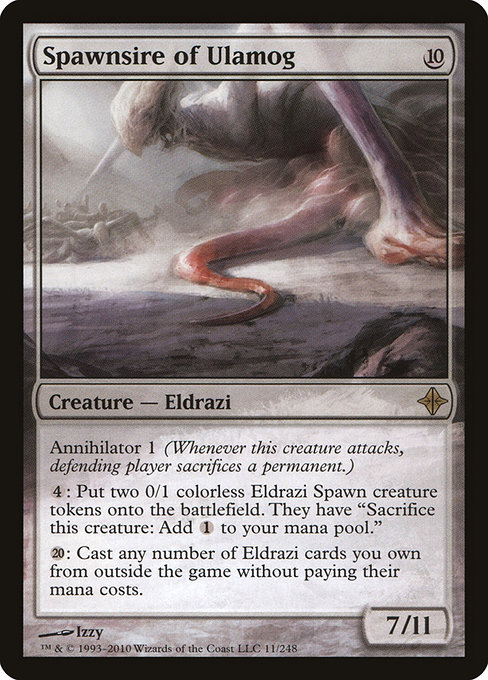

 0
0
 8.52€
8.52€
